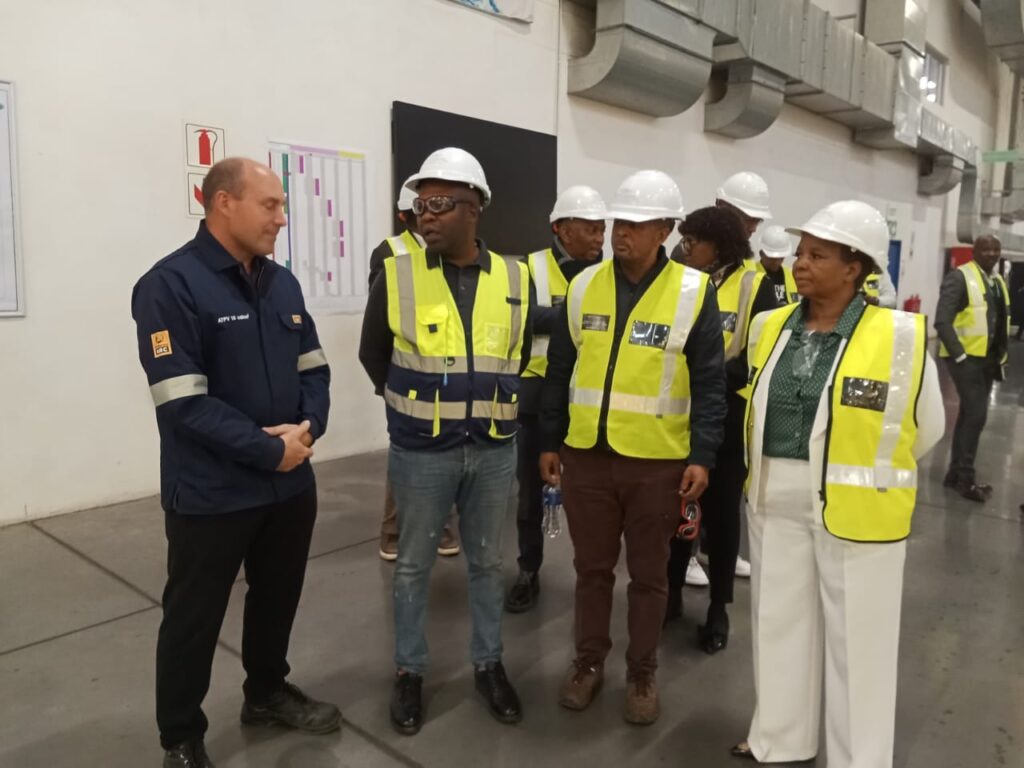
The newly appointed Member of the Executive Committee (MEC) for Finance and Economic Development in the Gauteng Province, Lebogang Maile, visited the Tshwane Automotive Special Economic Zone (TASEZ) in the administrative capital on Tuesday in Tshwane.
The purpose of this visit was to engage with the management and workers of TASEZ about the work of the agency in relation to the provincial government’s objective to strengthen industrialisation and ensure job creation in Gauteng.
Background of TASEZ
The Tshwane Automotive Special Economic Zone (TASEZ) is the first automotive city on the African continent. It is based in the north-east of the City of Tshwane, in the heart of the province’s automotive manufacturing industry.
TASEZ’s mandate is aligned and effectively born out of the national strategies of the South African government, particularly the Reimagined Industrial Strategy. This strategy aims to provide greater focus on strategic value chains.
This is achieved through promoting localisation and sector masterplans, ensuring that more South Africans benefit directly from the industrialisation process through job creation and more broad-based ownership of businesses, and promoting the legal and other modalities required to increase trade within Africa, through the African Continental Free Trade Area (AfCFTA).
TASEZ is part of the Special Economic Zones (SEZ) program, which includes other SEZs across the economic corridors of the province. The program is supported by intensive investment promotion, will be utilised to accelerate re-industrialisation of the Gauteng City Region.
The department will continue to support investment in the automotive sector, with special attention given to electric vehicles and autonomous vehicles. Working with national counterparts, the department will double efforts in resolving the logistical constraints faced by the auto-sector.
TASEZ manufacturing capacity and job creation
TASEZ operations are in full swing, with the completion of phase 1 and Phase 1 A of its development seeing the production of the first next-generation Ford Ranger getting into gear in November 2022.
This was the result of a capital investment of US$1.05 billion (R16 billion) by Ford Motor Company of South Africa (FMCSA) increasing its capacity from 160 000 to 200 000 vehicles annually and exporting vehicles to more than 100 global markets.
Over and above the R16 billion investment by FMCSA, investment into TASEZ by the 11 Tenants/Ford suppliers stands at R5,9 billion against an initial target of R3,4 billion. This investment has enabled the creation of 3 244 permanent jobs within the zone, with more than 65% of these jobs sourced from the surrounding communities. Of these jobs, 32% were filled by women and 65.4% by youth. In addition, TASEZ has so far recorded more than 5 071 construction jobs, consisting of 43% youth and 18% women.
This is in line with the department’s objective of strengthening access into the economy for marginal communities. This brings the total of direct jobs created through SEZ to over 8 000 direct jobs resulting in more than 18 396 indirect jobs.
Over 265 construction packages have been awarded to Small, Medium and Micro Enterprises (SMMEs) within the surrounding communities equating to R1,7 billion. This translates to 43% of all the construction packages. This program was enabled through the formal establishment of the Community Project Committee (CPC), Community Liaison Officers (CLO) and mentoring and training programmes geared at supporting both SMME and individual job seekers.
Plans within the 7th administration
Over the next two years, Ford Motor Company Southern Africa (FMCSA) is investing an additional R5.2 billion for the production of the first-ever Ranger plug-in hybrid electric vehicle (PHEV).
To this end, TASEZ, through the Inter-governmental Relations Agreement between the three spheres of government, has secured R392 million for internal bulks and a R932 million initial top structure funding for the establishment of a Ford sub-assembly of aftermarket components and sequencing facility for national and international markets.
Through these investments, the manufacturing capacity of the Gauteng Province will be strengthened, while more jobs are created.
MEC Maile’s visit to TASEZ forms part of his ongoing commitment to ensuring the functionality of institutional vehicles that are geared towards promoting sustainable and inclusive economic development.
Over the coming weeks, more initiatives aimed at ensuring revenue enhancement, industrialisation and job creation by the provincial government will be communicated.
Tshwane Talks readers have been able to read stories in this publication for free for over two years now. We still want our readers to access our stories for free, but we are asking those among our readers who can afford it to contribute at least R30 a month to cover some of the costs of publishing this independent, non-aligned online newspaper which gives a voice to all sectors of society irrespective of race, colour, creed, religion, or political affiliation. You may make your contribution by depositing at least R30 a month into Tshwane Talks' bank account. Details are as follows:
Bank Details
Bank: Standard Bank
Account Number: 10225548834
Account Type: Cheque Account